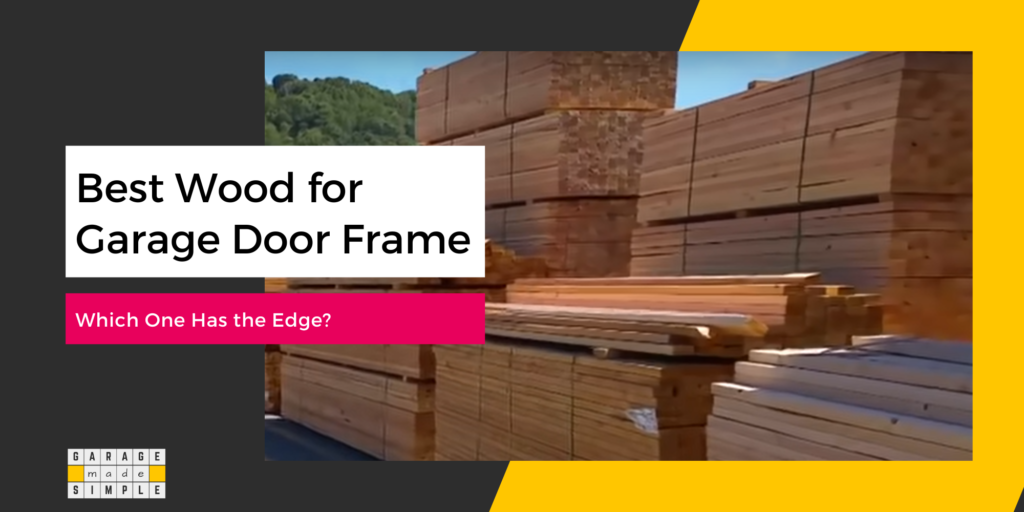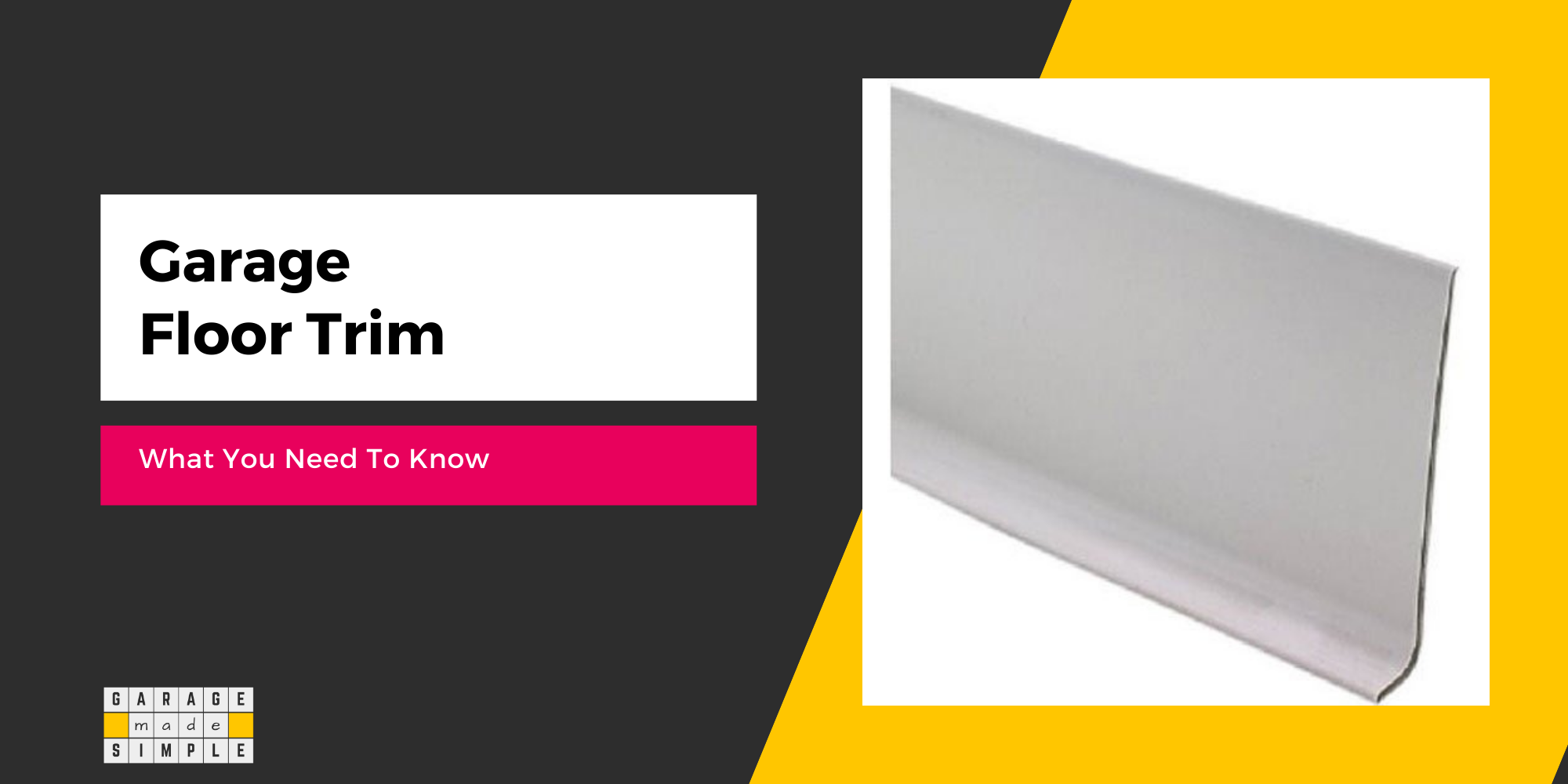Best Wood for Garage Door Frame: Which One Has the Edge?
As an Amazon Associate, I earn from qualifying purchases.
What is the Best Wood for Garage Door Frame?
Having a strong garage door to protect your cars and other precious stuff is very important, more so for an attached garage. Potential intruders can get into your house through the garage. But did you know that the garage door frame plays a critical role in garage door strength? So what is the best wood for garage door frame?
Cedar is the best wood for garage door frame. Redwood is even better but higher cost and poor availability, makes it the 2nd best option. Both are strong & sturdy and have natural oils that make them resistant to rot, decay, and insect damage. Douglas Fir, though not as good, is a budget friendly option!

Best Wood for Garage Door Frame: Key Takeaways
| Wood Type | Pros | Cons |
| Cedar | Strong & sturdy, Natural oils resist rot, decay, & insects | Not as good as Redwood |
| Redwood | Strong & sturdy, Natural oils resist rot, decay, & insects, Better than Cedar | High cost, Poor availability |
| Douglas Fir | Strong & sturdy, Natural oils resist rot, decay, & insects, Cheaper than Cedar & Rosewood | Not as good as Cedar or Redwood |
Pressure treated wood garage door frames are a budget friendly option. They are also rot, decay, and insect resistant, but have some disadvantages too! The chemicals, especially the copper based chemicals, infused in them can corrode metal parts in contact with them.
Using natural wood, devoid of man made chemicals is a healthy and eco friendly choice. Of course it comes at a cost.
Before I explain the advantages and disadvantages of each type of wood, I would like to explain the function and role of a garage door frame.
What Is the Function of a Garage Door Frame?
The garage door frame may not get much attention, but the fact is that it is vital to the strength and performance of the garage door. The garage door frame consists of a header, two vertical jambs, and a sill.
Specifically, a garage door frame
- Provides support for the garage door and is necessary for attaching it to the rough opening.
- Secures the garage door in place.
- Helps seal the gap between the door and the garage wall.
- Facilitates insulation of the garage door.
The garage door frame has a direct bearing on the strength of the garage door. A strong, sturdy and correctly installed garage door frame will
- Distribute the weight of the door evenly and prevent warping or twisting.
- Keep the door securely in place and prevent it from coming off its tracks or becoming misaligned.
- A misaligned garage door can bind or stick when opening or closing. This puts additional stress on the door, the garage door opener and other components. The result is higher wear & tear or even breakage.
- Prolong the life of the door and its components by sealing out drafts and moisture. The garage door will have a shorter lifespan due to corrosion under high humidity.
- High humidity in the garage leads to several other problems too. Cars and other items stored can suffer from rusting, delamination, mold growth, etc.
- Condensation on the garage floor will increase slip hazard, as well as damage the concrete.
Douglas Fir vs Redwood vs Cedar for Garage Door Frame
Here is a comparison of Douglas Fir vs Redwood vs Cedar considering suitability for use as a Garage Door Frame.
Durability
- Douglas Fir: Has a good durability, it is resistant to decay, rot, and insects, often used for framing and structural applications.
- Redwood: Has a very high durability, naturally resistant to decay, rot, and insects. In addition to garage door frames, it is often used for outdoor applications such as decks and fences.
- Cedar: Has a high durability, naturally resistant to decay, rot, and insects. In addition to garage door frames, it is often used for outdoor applications such as siding and trim.
Strength
- Douglas Fir: is possibly the strongest of the three. It has a high strength-to-weight ratio and good stiffness. It is commonly used for framing and structural applications involving heavy loading.
- Redwood: is strong but not as strong as Douglas Fir.
- Cedar: is the least strong of the three. However, it is strong and durable enough for a garage door frame.
Weather Resistance
- Douglas Fir: Has good weather resistance but not as high as the other two. Douglas Fir may experience some color change and cracking on prolonged exposure to UV rays, humidity and temperature variations.
- Redwood: Has a very high weather resistance. Redwood is resistant to UV rays, humidity, temperature variations and maintains its color well.
- Cedar: Has a high weather resistance. Cedar is resistant to UV rays, humidity, and temperature variations, but may experience some color change over time.
Ease of Maintenance
- Douglas Fir: requires more maintenance than cedar or redwood as it needs to be stained or sealed to maintain color and protect against weathering.
- Redwood: relatively low maintenance. May require occasional cleaning and staining. It can also be left to weather naturally.
- Cedar: relatively low maintenance. May require occasional cleaning and staining. It can also be left to weather naturally.
Natural Color
- Douglas Fir: natural color ranges from a yellowish-green to a reddish-brown.
- Redwood: natural color is a light reddish-brown.
- Cedar: natural color ranges from a pale pinkish-brown to a reddish-brown.
Cost
- Douglas Fir: is pretty affordable. It may not be the best option as it isnot resistant to rot, decay and insects but it costs significantly less. For example, at Lowes a 2-in x 4-in x 92-5/8-in Douglas Fir S4S Kiln-dried Stud is priced at only $3.98 per pc.
- Redwood: is usually 20% more expensive than Cedar. The bigger problem is lack of availability. Redwood trees are no longer being harvested.
- Cedar: is expensive. For example, at Lowes a 2-in x 4-in x 8-ft Cedar Smooth 4 Sides Green Lumber is priced at $13.98 per pc.
Can You Use Pressure Treated Wood for a Garage Door Frame?
Pressure treated pine is another option for a garage door frame. It has both advantages & disadvantages. You must keep them in mind should you decide to use it.
Advantages
- Pressure treated pine is a cost-effective option for a garage door frame.
- Pressure treated pine is durable as it is resistant to rot, decay and insect damage.
- As pressure treated pine is a softwood it can be easily cut, shaped and drilled according to the requirement of the frame.
- Pressure treated pine is quite lightweight and, therefore, easy to handle and install.
Disadvantages
- Pressure treated pine has a strong chemical odor when first installed.
- The chemicals used in the pressure treatment process can be harmful to both humans and pets if ingested or inhaled.
- More importantly, the copper based chemicals in the pressure treated wood result in galvanic corrosion of iron & steel hardware and garage doors that come in contact with the garage door frame.
- Galvanic corrosion is an electrochemical process that occurs when dissimilar metals come into contact in the presence of moisture.
- Pressure treated pine may be more prone to warping or cracking over time, especially if exposed to moisture.
Thank you very much for reading the post. I do hope you found it informative and useful.






